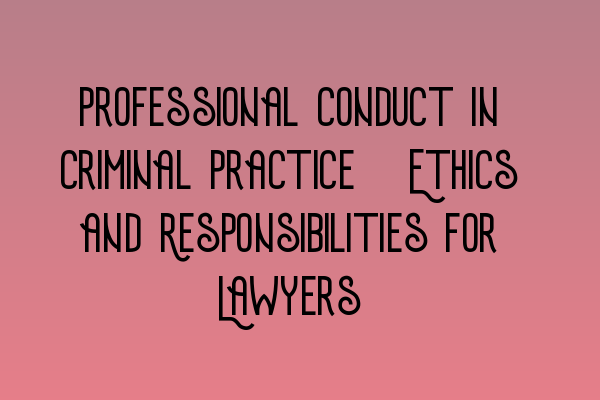Professional Conduct in Criminal Practice: Ethics and Responsibilities for Lawyers
Welcome to SQE Criminal Law & Practice Law UK! As a solicitor specializing in criminal law, it is essential to understand the importance of professional conduct, ethics, and the responsibilities that come with being a lawyer. In this blog post, we will delve into these crucial elements and provide you with valuable insights.
The Foundation of Professional Conduct
Professional conduct is the bedrock of the legal profession. It encompasses the ethical principles and standards that lawyers must adhere to in their practice. For criminal lawyers, these ethical standards form the foundation for how they interact with clients, the court, and fellow legal professionals.
As a criminal lawyer, it is your duty to act in the best interests of your clients while upholding the principles of justice and fairness. This means maintaining confidentiality, exercising competence, and avoiding conflicts of interest. Recognizing and navigating ethical dilemmas is a crucial aspect of being a responsible criminal lawyer.
To further understand professional conduct in criminal practice, it is important to familiarize yourself with the SQE 1 Practice Exam Questions and the SQE 1 Practice Mocks FLK1 FLK2. These resources will help you assess your knowledge and prepare effectively for any challenges you may encounter.
Responsibilities of Criminal Lawyers
Criminal lawyers have a multitude of responsibilities that extend beyond their clients. These responsibilities include upholding the rule of law, ensuring access to justice, and promoting fairness within the criminal justice system.
One significant aspect of a criminal lawyer’s responsibility is their duty to provide competent representation to their clients. This involves staying updated with the latest developments in criminal law, mastering trial advocacy skills, and being able to effectively communicate with clients, judges, and juries.
In addition to client representation, criminal lawyers also have a responsibility to maintain the integrity of the legal profession. This entails avoiding any actions that may bring the profession into disrepute and conducting themselves in a manner that upholds respect for the law.
If you are preparing for the SQE 2 exam, it is crucial to enroll in SQE 2 Preparation Courses that will equip you with the necessary knowledge and skills to excel in criminal law practice.
Safeguarding Confidentiality
Confidentiality is a fundamental aspect of the lawyer-client relationship. As a criminal lawyer, you must maintain the highest level of confidentiality to ensure trust and protect your clients’ rights. This means safeguarding any information shared by your clients and refraining from disclosing it without their consent, except in limited circumstances as permitted by law.
It is crucial to be familiar with the specific rules and regulations on confidentiality within the jurisdiction you practice. Understanding the SRA SQE Exam Dates is also important to stay updated on any changes or new developments in the legal profession.
If you are interested in learning more about the SQE exams and the preparation process, check out our comprehensive SQE 1 Preparation Courses. These courses are designed to provide you with the necessary knowledge and skills to pass the exams with flying colors.
In Conclusion
As a criminal lawyer, your professional conduct shapes your reputation and impacts the lives of your clients. Upholding ethical standards, understanding your responsibilities, and safeguarding confidentiality are essential elements of criminal practice.
If you are aspiring to become a criminal lawyer or are currently practicing, continuously educate yourself on professional conduct and ethics. This will not only enhance your legal skills but also ensure the highest level of professionalism in your criminal law practice.
For more information and resources, visit SQE Criminal Law & Practice Law UK, your trusted source for all things related to the SQE exams and criminal practice.
